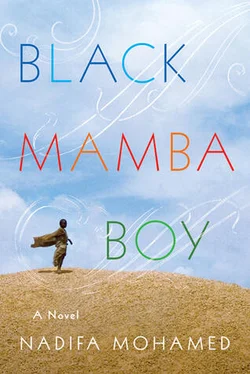Shidane’s father had been killed by a British bomb left behind from their campaign years earlier against the Mad Mullah, and the rage that this had spawned in Shidane sometimes made his temper flare up as brightly as magnesium. He would seek out fights and get pulverized. Jama and Abdi would then huddle silently around him, tentative, as he wheezed and swore at them for being cowardly, stupid, pathetic, his eyes bloodshot with held-back tears. Jama and Abdi loved Shidane, so they tolerated his foul mouth, his unreasonable demands, his cruelty; he was too charming to hold a grudge against. His gigantic eyes could be so sincere and full of compassion that they could not stay angry with him.
Without Shidane and Abdi, Jama’s days would be long, lonely, and almost silent. They had insinuated themselves deep into his heart, and Jama liked to pretend that they were his brothers. The only time they were separated now was when Shidane and Abdi went to Steamer Point to dive for pennies. Cruise ships on the way to India or the Far East stopped off in Aden and idle passengers would throw coins into the water to watch the gali gali boys risk their lives to collect them. Jama occasionally watched them, Shidane dangerously sleek and elegant in the water, Abdi struggling always with a mouthful of saltwater. After hours in the sea they would come ashore with their cheeks full of coins and spit them out at Jama’s feet; it was begging, but they made it look beautiful.
At Shidane’s instigation the gang would sometimes go looking for trouble. Indian kids, Jewish kids, and Yemeni kids all lived with their parents, however poor they might be. It was only the Somali children who ran around feral, sleeping everywhere and anywhere. Many of the Somali boys were the children of single mothers working in the coffee factories, too tired after twelve hours of work to chase around after boisterous, hungry boys. Their fathers came and went regularly, making money and losing it, with the monsoon trade. With no parental beatings to fear, the Somali boys saw the other children as well fed and soft enough to harass safely.
Jama, Shidane, and Abdi liked to prowl around Suq al-Yahud, and the Banyali area as well as old Aden. Today, they penetrated the Jewish quarter, walking under the flapping laundry crisscrossing the alleys, looking for boys their age to fight. The Jewish boys looked so prim and proper in comparison with them, overdressed with little skullcaps balanced on their heads, books tucked under their arms as they returned from yeshiva.
Shidane picked up a stone and lobbed it at one. “Hey, Yahudi, do they teach you this at your school?” he said with the secret envy of the illiterate. Abdi and Jama, although hesitant, picked up smaller stones and threw them as well.
The Jewish schoolboys piled up their books in a heap. “Somali punkah-wallahs, your fathers are dirty Somali punkah-wallahs!” they shouted and started bombarding the Somali boys.
Soon vile insults in Arabic against one another’s mothers were exchanged along with the stones. Jama chipped in with a few Hebrew insults he had learned from Abraham, a boy he used to sell flowers with: “ Ben Zona! Ben Kelev! Son of a whore! Son of a dog!”
The Jewish boys had sweat dripping down their temples into their ringlets, and their tunics were damp with it. Jama and Shidane cackled as they avoided the sharp stones, pushing Abdi out of the way whenever one was aimed at him. Hearing the commotion and obscenities, mothers came out onto their balconies to hector the little brats. They went unheard until one no-nonsense woman went indoors and returned with a large basin, tipping half of the dirty water on the Somali intruders and splattering the rest on the Sabbath-disrespecting sons of Israel. All of the boys ran away, Jama, Shidane, and Abdi fleeing together, passing fabric shops as their shutters closed for the holy day.
Abdi pinched a black waistcoat that was hanging from a nail and they ran even faster, their booty held aloft while a burly, bearded man chased them. “It’s the Sabbath, you shouldn’t be running!” shouted Jama over his shoulder, and Shidane and Abdi roared at his wit.
The man huffed and puffed behind them but eventually gave up, cursing them in Hebrew. “You should have had a shit. You’re too heavy to catch us!” shouted Jama in a parting shot, as they bolted from the neighborhood.
The Camel mukhbazar was a small, whitewashed greasy spoon with a few round tables inside and Somali baskets hung from the wall in an attempt at decoration. Most of its customers preferred to stand or sit outside in loud groups, metal plates of overcooked pasta or spiced iskukaris rice balanced in their hands. The Camel had become a meeting place for all the Somalis who washed up on the Yemeni coast looking for work. Merchants, criminals, coolies, boatmen, shoemakers, policemen all went there for their evening meal. Jama often hovered around its entrance, hoping to see his father or at least someone who had word of him. Jama did not know what his father looked like; his mother rarely talked about him. Jama always felt, however, that if he ever had the chance to catch his father’s eye, or watch him move or talk, he would instantly recognize him from among the untidy men with shaved heads and claim him as his own.
One windy day, as Jama’s legs and feet were being buffeted by flying refuse, he joined a group of men gathered around Ismail, the owner of the mukhbazar. The Somalis were flowing out into the road to the consternation of Arab donkey drivers and coolies, who struggled past with their heavy loads. Jama heard them cursing the Somalis under their breath. “Sons of bitches should go back to the land-of-give-me-something,” one hammal said. Jama fought the temptation to tell the men what the Arab had dared say. He eased his way into the crowd until he was at Ismail’s shoulder. Ismail was reading from an Arabic newspaper. “Italy declares war on Abyssinia, Haile Selassie appeals to the League of Nations,” he translated.
“To hell with that devilish imp!” shouted out a bystander.
“Colored Americans raise money in churches but the rest of the world turns its gaze,” Ismail carried on.
“Good! They turned their gaze too when the Abyssinians stole our land in Ogaden, handed over to them by the stinking English. If the Habashis can take our ancestral land then let the Ferengis take theirs,” shouted another.
“Runta! Ain’t that the truth! Look at this small boy.” Ismail suddenly lifted his head from the paper and pointed an angry finger at Jama. “Selassie is no bigger than him yet he has the nerve to call himself a king, an emperor, no less! I knew him in Harar, when he was always running to the moneylenders to pay for some work of the devil he had seen the Ferengis with. I bet he needs his servants to pick him up before he can relieve himself in his new French piss pot.”
Jama inched back, the finger still pointed at him as Ismail returned to reading. “The Italians have amassed an army of more than one million soldiers, and are stockpiling weapons of lethal capability. Somali and Eritrean colonial troops are already massed at the borders.”
Ismail stopped and screwed up his face. “One million? Who needs a million of anything to get a job done? This war sounds like the beginning of something very stupid.” He impatiently scrunched up the newspaper, wiping the ink from his fingers with a handkerchief, and padded back inside his mukhbazar.
Jama was eavesdropping on the men’s war talk; the names of strategic towns, disloyal nobles, Somali clans that had decided to fight with Selassie were thrown about over his head. Ismail leaned out the kitchen window and whistled at Jama. “Come in and make yourself useful, boy!”
Two cooks were working in the kitchen. A bald-headed, yellow-toned Somali man cooked the rice and pasta and another, taller man made vats of the all-purpose sauce of onion, tomato, and garlic.
Читать дальше
Конец ознакомительного отрывка
Купить книгу












